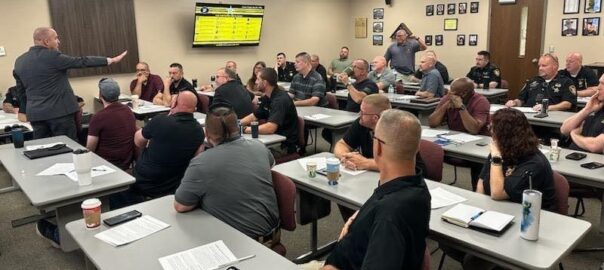(By Sheri Trusty, Seneca County Sheriff’s Office Public Relations Coordinator)
On Monday, July 21 and Tuesday, July 22, members of the Seneca County Sheriff’s Office staff underwent training to keep them up to date on best law enforcement practices and to ensure they have the skills and knowledge to remain poised in emergency situations. The courses were offered to help staff meet continuing professional training requirements outlined by the Ohio Attorney General’s Office. Peace officers must receive a minimum of 24 hours of training in 2025.
All courses must be approved by the Ohio Peace Officers Training Academy (OPOTA). Peace officers must complete eight hours of training in the four following mandatory course topics: Use of Force, Ethics Law, Legal Updates, and Search & Seizure. Peace officers can choose from a list of other topics to complete the additional 16 hours of training.
On Monday, July 21st, 55 law enforcement personnel from Seneca County and other counties attended the “Legally Confident – Tactically Confident” training at North Central Ohio Educational Service Center in Tiffin.
“I want to thank North Central Ohio Educational Services for letting us use the facility on Monday,” Seneca County Sheriff Fredrick Stevens said.
On Tuesday, July 22nd,, 20 law enforcement leaders from the Seneca County Sheriff’s Office and nine people from towns outside the county – including Galion, Perkins Township, and Toledo – attended the “Legally Confident – Tactically Confident for Leaders” course at the Seneca County Sheriff’s Office. Both classes were offered by Objectively Reasonable instructors Chief Scott Hughes and Robert “Bob” Meader, Esq.
“Training is necessary. It’s all about making sure you get the best instructors,” Sheriff Stevens said. “These particular instructors have walked the walk.”
The courses helped train law enforcement to handle emergencies safely and ethically and addressed the importance of creating a culture of respect and clear expectations so everyone involved stays safe. The instructors discussed real-life law enforcement emergencies and utilized bodycam footage from legal cases to train attendees, helping them dissect the situation and better understand best practice responses to difficult calls.
“Training is crucial,” Sheriff Stevens said. “Departments can be deeply affected by negligent training and negligent supervision.”
Not only is training vital for public safety, but it is also an effective tool for employee retention. Deputies who are skilled and confident in the field are less likely to leave law enforcement. Sheriff Stevens said the Seneca County Commissioners have been generous about funding training and the equipment that is needed for deputies to serve the community competently. A consistent roster creates a stronger safety net for the county.
“The commissioners have been wonderful about providing us with the funds so we can retain people,” Sheriff Stevens said.
Sheriff Stevens commits much time and effort into supporting his staff’s professional growth and competence so they are prepared to face any call that comes in.
“Being tactically and technically proficient makes you more confident. It helps you stay grounded,” Sheriff Stevens said.
